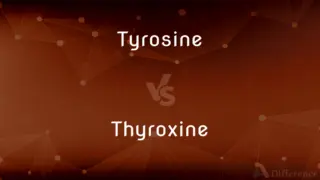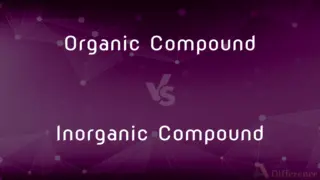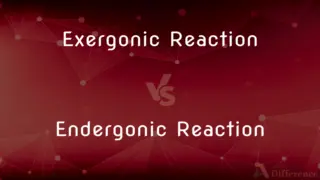Infirmness vs. Feebleness — What's the Difference?
Edited by Tayyaba Rehman — By Maham Liaqat — Updated on May 2, 2024
Infirmness generally refers to a state of physical or mental weakness due to illness or age, while feebleness is specifically the condition of being physically weak, often implying extreme delicacy.

Difference Between Infirmness and Feebleness
Table of Contents
ADVERTISEMENT
Key Differences
Infirmness encompasses a broad range of weaknesses, including those related to age, chronic conditions, or temporary illness. It can affect both physical and mental capacities. Whereas, feebleness typically refers to a lack of physical strength, often suggesting fragility and an inability to withstand stress or exertion.
In terms of usage, infirmness is often associated with a more permanent or ongoing state that may not improve significantly over time. On the other hand, feebleness can be either temporary or chronic, but it primarily focuses on the physical aspect rather than mental or overall health.
Infirmness can imply a medical or health-related condition that impacts various aspects of life, affecting mobility, cognition, and general functionality. Conversely, feebleness is more likely used to describe someone's physical condition, particularly in terms of muscle weakness or a general sense of physical inadequacy.
In a medical or healthcare context, infirmness might be used to describe a patient's overall declining state, especially in geriatric care. Feebleness, however, is more descriptive of specific symptoms such as muscle weakness or exhaustion, often used in both medical and lay contexts.
In literary or colloquial use, infirmness can convey a sense of vulnerability due to age or sickness, carrying a slightly formal or old-fashioned tone. Feebleness is similarly used but often conveys a more poignant sense of helplessness, especially in physical terms.
ADVERTISEMENT
Comparison Chart
Definition
General state of physical or mental weakness
Specific reference to physical weakness
Scope
Broad, affecting both physical and mental aspects
Narrow, primarily physical
Permanence
Often implies a longer-term or chronic condition
Can be temporary or chronic, but focuses on current state
Common Usage
Medical, elderly care, broader health discussions
Medical symptoms, physical incapacity
Connotations
Suggests overall decline due to various factors
Implies delicacy and inability to handle strain
Compare with Definitions
Infirmness
The condition of being weak in health or body, especially from old age.
The infirmness of his later years kept him confined to his home.
Feebleness
Reflecting a delicate or frail nature.
Despite his intellectual prowess, his physical feebleness kept him from the more active pursuits.
Infirmness
An overall state of debility or frailty.
The disease brought an unexpected infirmness to an otherwise vibrant personality.
Feebleness
Characterized by lacking the forcefulness or effectiveness of function.
A feebleness in leadership led to a lack of confidence among the team members.
Infirmness
Lacking firmness of will, character, or purpose; moral weakness.
In his infirmness, he could not decide whether to confront his adversary.
Feebleness
The state of being physically weak, often to an extreme degree.
His feebleness was evident as he struggled to even lift the lightest objects.
Infirmness
A quality or state of lacking physical strength or vitality.
After her surgery, she experienced a level of infirmness that required physical therapy.
Feebleness
Describing a faint or dim condition, in physical or metaphorical senses.
The feebleness of the lamp did little to illuminate the room.
Infirmness
Vulnerability to illness or effects of aging.
The winter months often tested the infirmness of the elderly in the village.
Feebleness
Lacking strength or vigor, typically due to age or sickness.
Feebleness of her limbs made daily tasks increasingly difficult.
Infirmness
The quality of being infirm; feebleness or illness.
Feebleness
Lacking bodily strength; weak
Too feeble to climb the hill.
Infirmness
Infirmity; feebleness.
Feebleness
Having little intensity or strength; faint
Feeble light.
A feeble voice.
Feebleness
Having little capacity to withstand pressure or strain
The castle's feeble defenses.
Feebleness
Lacking vigor or effectiveness; inadequate
A feeble attempt to apologize.
Feebleness
Showing little activity
A feeble housing market.
Feebleness
The quality or state of being feeble; debility; infirmity.
Feebleness
The quality or condition of being feeble; debility; infirmity.
That shakes for age and feebleness.
Feebleness
The state of being weak in health or body (especially from old age)
Feebleness
The quality of lacking intensity or substance;
A shrill yet sweet tenuity of voice
Common Curiosities
Is feebleness always related to old age?
Not necessarily, feebleness can result from various conditions, including illness and malnutrition, not just old age.
Can both terms be used interchangeably in medical contexts?
While there is some overlap, it is more precise to use infirmness for a broader condition and feebleness for specific physical weaknesses.
How do these terms relate to elderly care?
In elderly care, infirmness might be used to describe the cumulative challenges faced by aging individuals, while feebleness might focus more on their physical limitations.
What is the main difference between infirmness and feebleness?
Infirmness refers to a general state of weakness, often due to aging or illness, affecting physical and mental capacities, while feebleness specifically describes physical weakness.
Which term is more severe, infirmness or feebleness?
Both can imply severity depending on the context, but infirmness often suggests a more comprehensive impact on a person’s overall health.
How should healthcare professionals use these terms?
Healthcare professionals should use these terms to accurately describe a patient’s condition, distinguishing between general debility (infirmness) and specific physical weakness (feebleness).
Can young people be described using these terms?
Yes, young people can be described as feeble if they exhibit physical weakness, and as infirm if they are overall weak due to health issues.
What are common synonyms for infirmness and feebleness?
Synonyms for infirmness include frailty, weakness, debility; for feebleness, synonyms include weakness, frailness, delicacy.
Can mental health be described as feeble?
Typically, feebleness refers to physical states; mental health might rather be described as fragile or vulnerable, not feeble.
What can cause feebleness in a normally healthy person?
Causes can include severe illness, lack of nutrition, extreme fatigue, or specific medical conditions that weaken muscle strength.
Share Your Discovery

Previous Comparison
Ecumenism vs. Ecumenicalism
Next Comparison
Infinity vs. GoogolplexAuthor Spotlight
Written by
Maham LiaqatEdited by
Tayyaba RehmanTayyaba Rehman is a distinguished writer, currently serving as a primary contributor to askdifference.com. As a researcher in semantics and etymology, Tayyaba's passion for the complexity of languages and their distinctions has found a perfect home on the platform. Tayyaba delves into the intricacies of language, distinguishing between commonly confused words and phrases, thereby providing clarity for readers worldwide.
















































